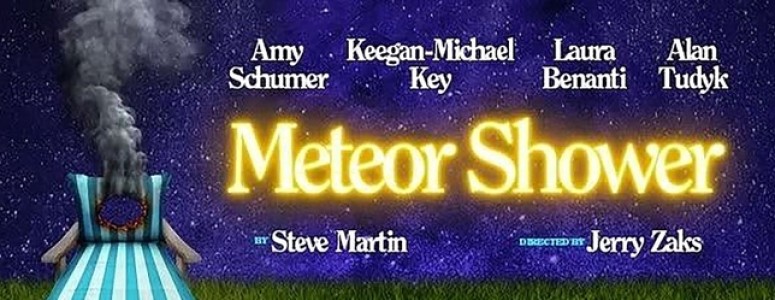“And then I woke up.”
How many times have grammar-school teachers run into this line at the end of their students’ compositions?
Steve Martin doesn’t quite use the time-worn conclusion in METEOR SHOWER, his semi-new play. (He started it a couple of decades ago.)
But he might as well have employed it. Near the comedy’s end, he tells us exactly what’s been on his mind after having played with ours for 80 or so intermissionless minutes.
The show takes place on one of those rare nights when meteors will fly close to the earth and create natural fireworks that are well worth seeing.
They are indeed, thanks to Showmotion, Inc.’s very special effects on a dynamic cyclorama. The night sky and what happens on it are among the show’s best assets. Beowulf Boritt’s set is, too: California chic.
(The California Convention and Visitors Bureau may not be happy with Martin’s portraying Golden Staters as eccentric as he’s made them — as many East Coasters like to think they are.)
Because Corky (Amy Shumer) and Norm (Jeremy Shamos) live in a Los Angeles suburb that affords a panoramic view of the sky, they’ve invited Gerald (Keegan-Michael Key) and Laura (Laura Benanti) to their home.
See how much time will pass before you say, “Hey, this is kinda like WHO’S AFRAID OF VIRGINIA WOOLF?” That’s especially true of Edward Albee’s first act that’s pretty funny (and isn’t much shorter than Martin’s entire play).
This time, though, the visitors are the ones who blatantly fight the way couples usually only do in the privacy of their homes. Corky and Norm watch and wince in horror while pretending that nothing’s wrong or that the last zinger was merely a joke.
Taking that stand is substantially harder when Gerald and Laura oh-so-matter-of-factly or viciously-on-purpose insult Corky and Norm.
Most playwrights like to give their characters a secret or two, and Corky’s is a beaut. Amy Shumer shows the requisite shame when it’s revealed and is rewarded with a good laugh from the audience.
But for most of the show Shumer, who’s sold m-a-n-y tickets for this venture, merely comes across as adequate. Her performance is very meat-and-potatoes with far more spuds than steak.
At least it’s not ham. However, because Shumer plays most of her scenes with Laura Benanti and Jeremy Shamos, she’s condemned to be outclassed by these true theater pros.
Benanti, never looking better, radiates the style and class that Corky wishes she had (which is part of Martin’s message, too). She splendidly conveys a superior attitude that’s bigger than Lake Superior.
Shamos beautifully displays in his delivery and demeanor that he could play any harried, flustered and exasperated husband and get giggles galore. Shamos works constantly, thank the Lord, but he’d be even more pursued by producers if this were the ‘50s and ‘60s when mildly ribald sex comedies peppered Broadway houses.
Jerry Zaks isn’t suffering, either, not with two other barnburners on Broadway. (Underneath the marquee of the Booth, his name in the biggest lettering a director may have ever received). Zaks lets the play breathe at its own pace, which is what good directors usually do with such comedies.
Keegan-Michael Key has the bombast of a mover and shaper (as Sondheim would say) and the danger of a hair-trigger (and trigger-happy) narcissist. He does very well in showing that Gerald is the type of guy who doesn’t listen to what others have to say because he feels his own thoughts are far more worth his attention.
During a play full of sex and drugs and Beethoven, you’ll spend some time thinking “No, that character would never do that,” “No, that would never happen” and, far more accurately, “No, that COULD never happen.” That’s especially true of a scene involving a costume that’s stranger than some seen in the Village Halloween parade.
(By the way, is an actual meteor shower a metaphor for something? After the show, I was quick to Google, but found nothing. Let me know if you come up with something.)
So the comedy goes from the ridiculous to – not the sublime, but the more ridiculous. Martin knows how to finesse it all thanks to his final escape clause. It could have you rolling your eyes in an is-that-all-there-is appraisal.
Martin’s point is valid – most everyone does feel some apprehension before unfamiliar people come to visit – and yet, you may feel that a trick has been played on you.
To be fair, though, there must be some grammar-school teachers who, despite sighing when reaching “And then I woke up,” still enjoyed what they’d read beforehand. You might, too, with METEOR SHOWER.




